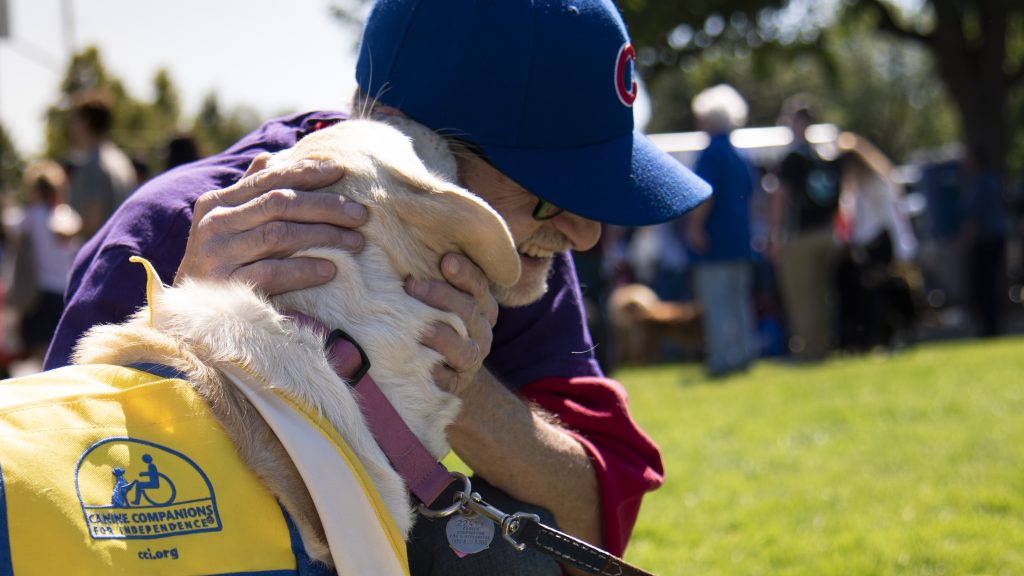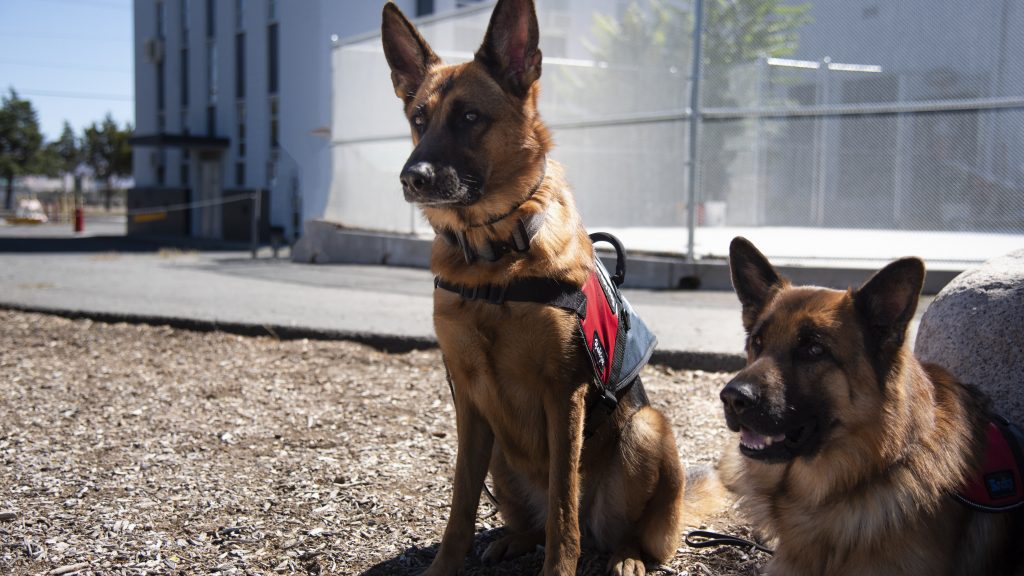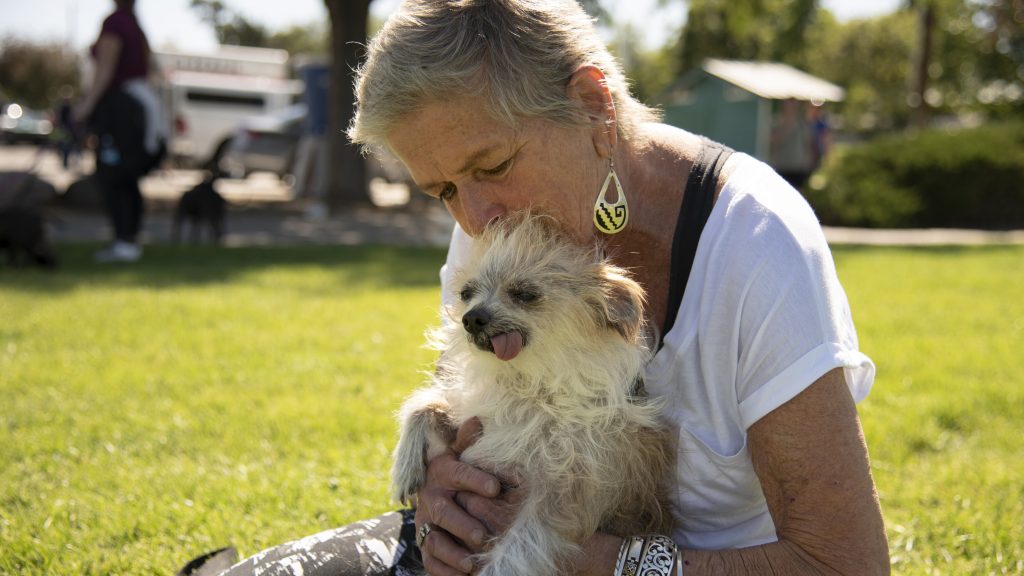
Nevada, we have a problem. According to Mental Health America (MHA), Nevada ranks dead last when it comes to overall ranking of mental health. That’s true for both adults and youth. The low rankings stems in part from issues of access to care and an inadequate number of providers.
Veterans are at particularly high risk for devastating mental health illness. One in four veterans returning from combat suffer from depression or anxiety, post-traumatic stress disorder or traumatic brain injury, according to the Department of Veterans Affairs. In the U.S., an average of 22 veterans die by suicide a day.
That’s why Nevada is trying a new program: prescribing service dogs to veterans with post-traumatic stress disorder. In addition, law enforcement agencies and advocacy centers are using emotional support service animals for their victims of crime.
Service dogs reduce medical and psychiatric costs, suicidal thoughts, risk of violence, alcoholism, drug use and depression, and serious mental breakdowns. The emotional support service dog provides the veteran a sense or protection and unconditional love.
Not only that, the dogs are also trained to perform what’s a called a tactile interruption to ground their human during a panic attack. If a veteran where to have a flashback or nightmare, the dog will sense this and start nudging, pawing or licking. Deep pressure stimulation is where the dog utilizes their body weight as a grounding mechanism to help reduce or alleviate anxiety or panic. The animal is also trained to turn on the lights or open a door, especially during nightmares or before the veteran enters the home. These are just a few things that these extraordinary animals can be trained to do for veterans with mental trauma.

A report on PTSD service dogs showed that there are clear advantages to using psychiatric service dogs. Statistics show that 82% of those suffering from PTSD reported symptom reduction after being united with a service dog. Another report showed that the use of medication decreased by 40%.
In addition to working with individuals, emotional support service dogs are helping in public settings as well. Canines are being introduced to court houses and law enforcement agencies to help reduce anxieties in victims when in a stressful environment or situation.
In 2020, the Reno Police Department brought in a trained emotional support dog to use within the Victims Services Unit and the Child Advocacy Center. They’re the first law enforcement agency in Nevada to adopt this program put on by the Courthouse Dogs Foundation.
“Aside from being highly trained ultracool dogs, they will be used in sensitive interviews, such as child sexual assault, and can serve a number of advocacy type settings to help calm victims and help to prevent further secondary trauma,” said Michael Browette of the Reno Police Department.

Scientific research confirms that the presence of dogs reduces stress in humans. The trained dog would significantly reduce the stress and anxiety associated with the intensive interviews, thereby improving the efficiency and quality of the process.
“Not only will the service animal reduce the stresses in victims, but it will also reduce the stress levels in first responders who are on the front lines,” said Browette.
With the emergence of more and more non-profit organizations that focuses around emotional service animals, there is hope to combat the mental illness epidemic that our country has been plagued with. One paw at a time.

Studies referenced:
[1] Effectiveness of Psychiatric Service Dogs in the Treatment of Post-Traumatic Stress Disorder among Veterans, by Dr. James Gillett, Ph.D., Mcmaster University and Rachel Weldrick, BA, McMaster University.
[2] The Use of Psychiatric Service Dogs in the Treatment of Veterans with PTSD. Craig Love Ph.D., US Army Medical Research and Materiel Command, Fort Detrick, MD, 2009.

Nevada, we have a problem. According to Mental Health America (MHA), Nevada ranks dead last when it comes to overall ranking of mental health. That’s true for both adults and youth. The low rankings stems in part from issues of access to care and an inadequate number of providers.
Veterans are at particularly high risk for devastating mental health illness. One in four veterans returning from combat suffer from depression or anxiety, post-traumatic stress disorder or traumatic brain injury, according to the Department of Veterans Affairs. In the U.S., an average of 22 veterans die by suicide a day.
That’s why Nevada is trying a new program: prescribing service dogs to veterans with post-traumatic stress disorder. In addition, law enforcement agencies and advocacy centers are using emotional support service animals for their victims of crime.
Service dogs reduce medical and psychiatric costs, suicidal thoughts, risk of violence, alcoholism, drug use and depression, and serious mental breakdowns. The emotional support service dog provides the veteran a sense or protection and unconditional love.
Not only that, the dogs are also trained to perform what’s a called a tactile interruption to ground their human during a panic attack. If a veteran where to have a flashback or nightmare, the dog will sense this and start nudging, pawing or licking. Deep pressure stimulation is where the dog utilizes their body weight as a grounding mechanism to help reduce or alleviate anxiety or panic. The animal is also trained to turn on the lights or open a door, especially during nightmares or before the veteran enters the home. These are just a few things that these extraordinary animals can be trained to do for veterans with mental trauma.

A report on PTSD service dogs showed that there are clear advantages to using psychiatric service dogs. Statistics show that 82% of those suffering from PTSD reported symptom reduction after being united with a service dog. Another report showed that the use of medication decreased by 40%.
In addition to working with individuals, emotional support service dogs are helping in public settings as well. Canines are being introduced to court houses and law enforcement agencies to help reduce anxieties in victims when in a stressful environment or situation.
In 2020, the Reno Police Department brought in a trained emotional support dog to use within the Victims Services Unit and the Child Advocacy Center. They’re the first law enforcement agency in Nevada to adopt this program put on by the Courthouse Dogs Foundation.
“Aside from being highly trained ultracool dogs, they will be used in sensitive interviews, such as child sexual assault, and can serve a number of advocacy type settings to help calm victims and help to prevent further secondary trauma,” said Michael Browette of the Reno Police Department.

Scientific research confirms that the presence of dogs reduces stress in humans. The trained dog would significantly reduce the stress and anxiety associated with the intensive interviews, thereby improving the efficiency and quality of the process.
“Not only will the service animal reduce the stresses in victims, but it will also reduce the stress levels in first responders who are on the front lines,” said Browette.
With the emergence of more and more non-profit organizations that focuses around emotional service animals, there is hope to combat the mental illness epidemic that our country has been plagued with. One paw at a time.

Studies referenced:
[1] Effectiveness of Psychiatric Service Dogs in the Treatment of Post-Traumatic Stress Disorder among Veterans, by Dr. James Gillett, Ph.D., Mcmaster University and Rachel Weldrick, BA, McMaster University.
[2] The Use of Psychiatric Service Dogs in the Treatment of Veterans with PTSD. Craig Love Ph.D., US Army Medical Research and Materiel Command, Fort Detrick, MD, 2009.





